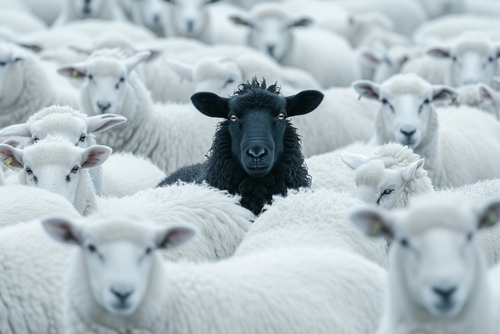The100: Finding great stories, the black sheep paradox and friendship
Who are the (most) chosen ones?
Kantar have published their latest Brand Footprint reports. These show the most chosen brands globally and regionally. Hats doffed (damn it), because the reports are actually very interesting. Can you guess the global top 10?
And there are 20 brands capturing the attention of the so called ‘Boomers’.
Sparkling Ice anyone?
Words that work
Copywriting legend, Vikki Ross, was interviewed by Neil Perkin on the power of great copy. And as you would expect, she has an endless supply of awesomeness:
- Use your brand voice like you use your logo. On everything.
- Find more unique adjectives for your brand tone than ‘honest’ or ‘friendly’.
- The client should provide the “what”. But leave the writer to the “why”.
The black sheep paradox
Independent thinking and not following the crowd can make us successful. So, without being deliberately contrarian, what practices can help you zag while others zig? Pray, Eric Markowitz, do tell…
- Deep learning – Developing an expertise in a single subject in your professional field can help you make better decisions when the time comes.
- Diverse learning – However, don’t settle for being a single subject expert. Learn as much as you can, about as much as you can. Diverse learning helps you think more laterally.
- Writing – You can use writing to see if you understand something, or if something even makes sense in the first place. Writing has a way of letting your mind freely wander into what it really believes.
“Another problem, muses Ariely…”
Dan Ariely spent a week interning at an ad agency to see what he could learn. Apart from observing that the people were ‘very young, very attractive, and dress in a very interesting way’, he also had some thoughts on the billable hour and why agencies don’t start a brief with the things that they already know:
“The upshot of the billable hour, says Ariely, is that agencies aren’t rewarded for bringing existing knowledge or expertise to a brief. If an agency put 30% of its effort into creating a generalised understanding of important topics, nobody would pay for it,’ continues Ariely. ‘So the incentives are actually against agencies creating generalised knowledge and against making the effort to understand a topic, not in a specific sense, but in a general sense.’’
How to find stories
Jon Ronson (I highly recommend his Things Fell Apart podcast), has written about how to find stories. I like how he describes finding a gem and what that means:
“By gems I mean a little glimpse of something surprising and dissonant and mysterious – a person or a situation or a moment in history where you think, ‘I didn’t expect that’ or ‘I don’t understand that, I’d like to go down a rabbit hole about that.’ It could be the tiniest thing. But if your mind is tuned right, you might spot it.”
And finally…
Ian Leslie’s 20 observations on friendship.
Staff at Oregon Zoo hid a camera in the lion enclosure. It wasn’t long until those lions decided to take their new friend for a little walk.
My son is 13. Every day I listen to him chat with his mates, and understand perhaps 1 sentence in 3. However, I have started using the phrase ‘What the sigma’. More on Generation Alpha


Comments
Comments are disabled for this post